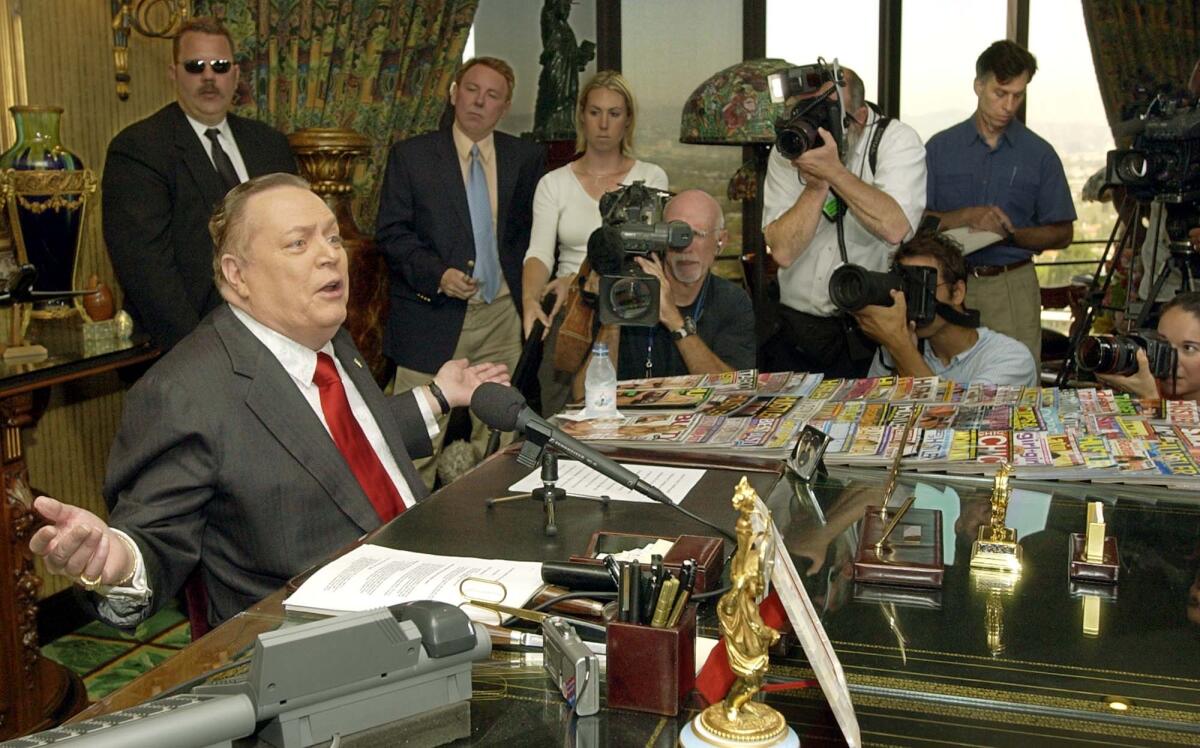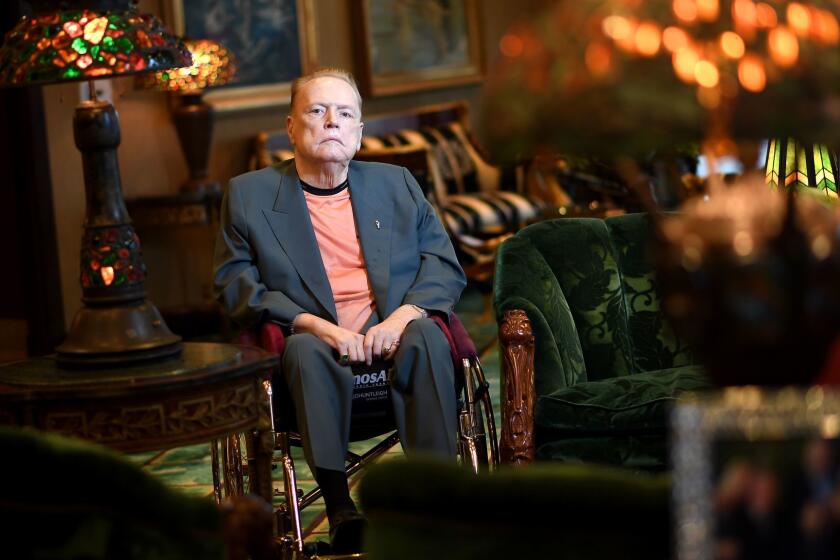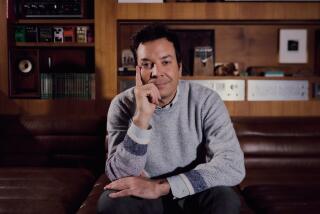Appreciation: Why working with Larry Flynt was an endless adrenaline rush â and an education

I was Larry Flyntâs book publicist and personal publicist for 15 years â from 1996, three months before the movie âThe People vs. Larry Flyntâ was released, until 2011. I watched him be mesmerized by Terry Gross during their âFresh Airâ interview and get slaughtered by Bill OâReilly on Fox News. He did all the shows â Bill Maher to Larry King, CNN again and again, and Iâd play poker with him to pass the time in every green room in town.
Working for Mr. Flynt, as I always called him, taught me more about the personalities, secrets, limitations and roadblocks of the media than all my other clients combined. Meeting with him a few times a week at his office on Wilshire Boulevard or at the Four Seasons was an endless adrenaline rush. What might he say, to whom might he say it, what would I need to do about the fallout?
A businessman first, his primary concern was making money. Heâd have a briefing each morning about the stock market and heâd check the numbers throughout the day, but as carefully as he monitored the fluctuations on Wall Street, he also compulsively watched CNN, MSNBC and Fox News â often simultaneously. Next to making money, politics was all that mattered. He was a major contributor to the ACLU.
The foreign press adored him. And American journalists and celebrities, no matter how they might have bashed him in public, would fall over themselves to get a handshake on seeing him at a restaurant or in a private meeting. He was glamorous, like a mysterious, charismatic character from a novel â he loved the spotlight, he told the truth and he was fearless.
He had his faults and his detractors, but my recollections of Mr. Flynt, who died Wednesday at age 78, are here for whoever wants to read them. As he would say, no one is forcing you to read this. Itâs a free country. Or at least thatâs the goal, and Larry Flynt spent the second half of his life trying to keep it that way.
He hired me to promote his first book, âAn Unseemly Man: My Life as Pornographer, Pundit, and Social Outcast,â in 1996. âWhat are you wearing to the interview?â my mother asked me. I fell over laughing, but this is what everyone wanted to know.
Larry Flynt, the founder of Hustler magazine, repackaged himself again and again â an unlikely 1st Amendment champion, a self-appointed arbitrator of political hypocrisy and a born-again Christian.
His office was the size of a football field. Several plush couches and chairs, vases, floor-to-ceiling paintings and his massive desk made from ⌠was it Italian marble? It was all so intimidating. And there he was â sitting in his gold-plated wheelchair behind that desk, wearing a bright green sweater, puffing on his cigar, a swirl of smoke rising above the solid gold #1 pendant blinding me from across the room. (I wore a tailored suit and low heels.)
We had spoken on the phone several times already, and the interview was brief, my answers rote. I did the best I could. And then he said, âThis interview doesnât really matter. Iâve already decided to hire you because youâre so good on the phone and I figure most of the work you do is over the phone, so youâve already passed the test.â He was, of course, right. Not that Iâm so good on the phone, but thatâs how we did all our work back then, before email and texting. Flynt made his decisions from instinct and playing the odds, and that was the first lesson I learned from him â trust your gut.
Watching him expose hypocritical politicians like Reps. Bob Barr and Bob Livingston â the House Speaker-designate who stepped down amid Bill Clintonâs impeachment trial after admitting an extramarital affair â was fascinating. Observing firsthand how the media would blatantly censor Mr. Flynt â rewrite his words, cut a swath of his interview out of the tape to shift the context â was another eye-opener.
Hearing him speak so bluntly to reporters was always hilarious yet could be stressful. What might he say? Weâd be at lunch and someone from Vanity Fair or Newsweek might call: âWhat can you tell me about the Livingston case? âHe was the third in line,â Flynt would rattle off, referencing the order of presidential succession, âand everything that he was accusing Clinton of he was doing himself. He had three mistresses. He made Clinton look like Mary Poppins.â And that was it. The reporter wanted that precious sound bite, and Flynt was delighted to deliver it.
When we held a news conference about Livingston, more than 200 reporters showed up, landing their helicopters on Mr. Flyntâs Wilshire rooftop, standing crushed together in his office, their cables running up and down the hallways. Livingston had called Mr. Flynt a âbottom feeder,â and when asked about it, my clientâs face broke into one of his classic slow smiles as, in his much-imitated gravelly voice, he unloaded one of his favorite and oft-repeated lines: âYeah, thatâs right, but look what I found when I got down there.â
He got a huge laugh.
âI disagreed with Falwell,â Flynt said, who died on Wednesday, âon absolutely everything he preached, and he looked at me as symbolic of all the social ills.â
Larry Flynt was always a gentleman to me and to the people I brought to interview him. He was gracious. He was on a mission to keep politics and our politicians honest, and he despised hypocrisy, especially in government. He wasnât afraid to dig to find the truth, to accuse, because he already knew that staying alive for so long after a near-fatal gunshot â a wheelchair user for more than 40 years â was a miracle, but also a certain kind of death in and of itself. I never heard him complain. I believe he wanted to make a difference. As Thomas Friedman wrote in his review of âThe People vs. Larry Flynt,â âLarry Flynt is a true American hero.â
I had stopped being his publicist several years before Trumpâs election. But when Trump won, I called Mr. Flynt and asked if he wanted to go to lunch â âI need you,â I told him, âto tell me why we shouldnât be worried.â Lunch to him was breakfast. Over his eggs, juice and coffee, he put his hand on my arm, as he always did when about to make a pronouncement: âKe-em,â he said, âdonât worry. Trump is just crazy. Itâll all fizzle out.â
Dower is a literary publicist and poet; her latest collection is âSunbathing on Tyrone Powerâs Grave.â
More to Read
Sign up for our Book Club newsletter
Get the latest news, events and more from the Los Angeles Times Book Club, and help us get L.A. reading and talking.
You may occasionally receive promotional content from the Los Angeles Times.









